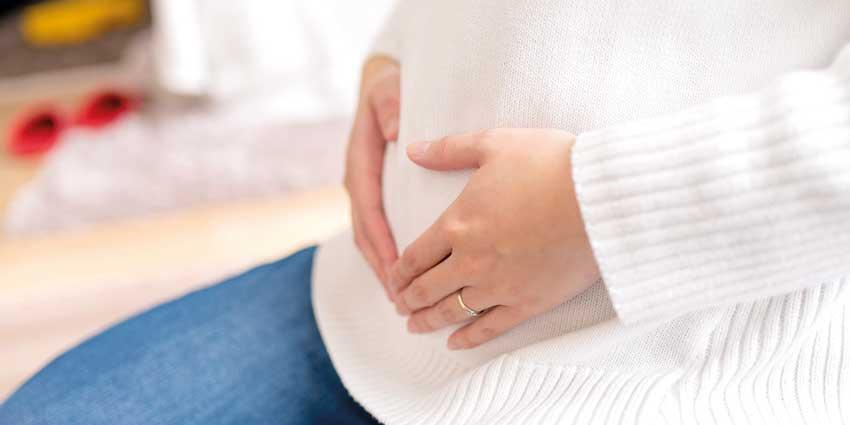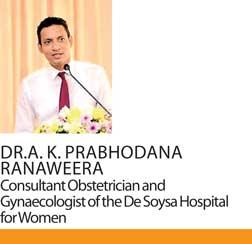06 Nov 2020 - {{hitsCtrl.values.hits}}

 Hearing about the death of a baby before or after birth can cause a mother to plunge into the depths of depression. This is quite heartbreaking, yet is an unfortunate and common situation that many expecting mothers experience worldwide. However, talking about the loss of a baby during pregnancy or childbirth is still a taboo subject in society. The topic is associated with shame and brings disrespect to the parents, especially the mother. Avoiding such conversations will not help us understand the mother’s grief; which badly impacts the mother’s psychological wellbeing. The Health Capsule spoke to Dr. A. K. Prabhodana Ranaweera, Consultant Obstetrician and Gynaecologist of the De Soysa Hospital for Women, with the intention of enlightening the public on pregnancy loss. According to Dr. Ranaweera pregnancy loss can occur in the first and second trimesters (miscarriages), from 24 weeks until delivery (stillbirth), soon after birth or within the first week after delivery (Early Neonatal death).
Hearing about the death of a baby before or after birth can cause a mother to plunge into the depths of depression. This is quite heartbreaking, yet is an unfortunate and common situation that many expecting mothers experience worldwide. However, talking about the loss of a baby during pregnancy or childbirth is still a taboo subject in society. The topic is associated with shame and brings disrespect to the parents, especially the mother. Avoiding such conversations will not help us understand the mother’s grief; which badly impacts the mother’s psychological wellbeing. The Health Capsule spoke to Dr. A. K. Prabhodana Ranaweera, Consultant Obstetrician and Gynaecologist of the De Soysa Hospital for Women, with the intention of enlightening the public on pregnancy loss. According to Dr. Ranaweera pregnancy loss can occur in the first and second trimesters (miscarriages), from 24 weeks until delivery (stillbirth), soon after birth or within the first week after delivery (Early Neonatal death).

Dr. Ranaweera explained that these can occur due to maternal problems, foetal problems or placental problems including abruption. Maternal problems usually involve medical issues such as diabetes, high blood pressure, autoimmune disorders, rare genetic disorders, toxoplasmosis and other infections. Foetal problems can occur due to foetal anomalies or infections. Placental problems highly contribute to pregnancy loss as well. If the placenta is not properly functioning, the nutrition and oxygen that are passed from mother to baby will be affected.
Prevention
Planning the pregnancy is quite important and there are methods of preventing pregnancy loss. Meeting a physician and conducting pre-conception counselling, that includes risk assessments and disease management, will help reduce the chances of poor perinatal outcomes. If the mother is a victim of certain medical disorders she should be identified and managed properly before embarking on the journey of motherhood. If these disorders are properly managed complications can be reduced and the mother can return home with a healthy baby.
Addressing the trauma
“For a person experiencing this it doesn’t matter if it is the first or second occasion the individual has experienced a miscarriage, stillbirth or early neonatal death. The psychological effect will be the same as losing a child for the first time. If this trauma is not properly managed it could lead to self-harm or depression. We have to be very humane about it,” Dr Ranaweera stated.
Blaming the mother and adding guilt to the loss will cause unhealthy prolongation of the grieving process which can lead to many complications.
A pregnancy loss is such a devastating experience. Therefore, the delivery of the dead foetus should be planned and expedited.
A proper investigation process should be conducted as soon as possible while providing the mother time and space to heal from the loss.
Rosebud Service
The De Soysa Hospital for women offers a special “Rosebud” service, launched by Dr Ranaweera to help mothers survive these tough times. It is designed to care for mothers who experience 2nd trimester miscarriages, stillbirth and early neonatal death.
From the time of diagnosis, the mothers will be under the rosebud care with specialised nurses assisting the parents in their psychological healing journey. They provide the parents with much-needed psychological support.
A painless delivery plan and post-delivery care will be provided.
The placenta, along with the mother’s blood will be sent for investigation soon after delivery to determine a cause for the pregnancy loss. A post-mortem will be conducted with the consent of the parents to gather further information regarding the cause of death.
“We allow the mother to attend the funeral if she wants to because we believe that every culture has a way of dealing with death, which is also a coping mechanism,” Dr Ranaweera declared.
The service also offers assistance in planning and managing future pregnancies depending on the findings of the investigation process.
Since the parents are under the rosebud care in this part of their life, their future pregnancies are planned and managed easily. “After a year or two, some parents visit us with their new baby and this is a remarkable achievement for us,” Dr Ranaweera stated.
21 Dec 2024 3 hours ago
21 Dec 2024 4 hours ago
21 Dec 2024 7 hours ago
21 Dec 2024 7 hours ago
21 Dec 2024 8 hours ago